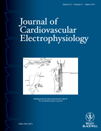Utility of Esophageal Temperature Monitoring During Pulmonary Vein Isolation for Atrial Fibrillation Using Duty-Cycled Phased Radiofrequency Ablation
Joris R. de Groot is supported by a personal grant of the Netherlands Heart Foundation, 2009T021.
No disclosures.
Abstract
Esophageal Temperature Monitoring During PVAC Ablation. Introduction: A novel ablation system has been introduced for rapid treatment of atrial fibrillation (AF). This system delivers duty-cycled phased radiofrequency (RF) energy via an over-the-wire catheter (PVAC®, Medtronic) to achieve pulmonary vein (PV) isolation. Lower power and depth control suggests that collateral damage might be minimized. However, no studies have investigated the potential for thermal effect and damage to the esophagus.
Methods and Results: Ninety consecutive patients undergoing PV-isolation were evaluated. Group A (48 patients) had continuous luminal esophageal temperature (LET) monitoring using a temperature probe with 3 metal electrodes located in the vicinity of the targeted PV ostia. Ablation ceased when LET exceeded 40 °C. Only patients with LET ≥ 39 °C underwent endoscopic evaluation to assess esophageal damage. Group B (42 patients) excluded LET monitoring but all patients underwent endoscopy. In Group A, 27 (56%) patients showed LET ≥ 39 °C (mean LET 40.5 °C). Endoscopy revealed esophageal alterations in 5 (8%) (3 erythema and 2 intramural bleeding). One hundred eighty-nine out of 190 (99.5%) targeted PVs were successfully isolated, with 1 PV unsuccessful due to high LET. In Group B all 165 targeted PVs (100%) were successfully isolated. Endoscopy in Group 2 revealed no esophageal alterations.
Conclusions: Using a duty-cycled, phased RF ablation system is safe and effective to isolate PVs. No Eso alteration was documented after ablation when LET was not monitored. This suggests that the LET probe may contribute to the thermal effect. Whether the documented increments in LET are due to direct tissue heating or possible interaction between the LET probe requires further investigation. (J Cardiovasc Electrophysiol, Vol. 22, pp. 255-261, March 2011)




